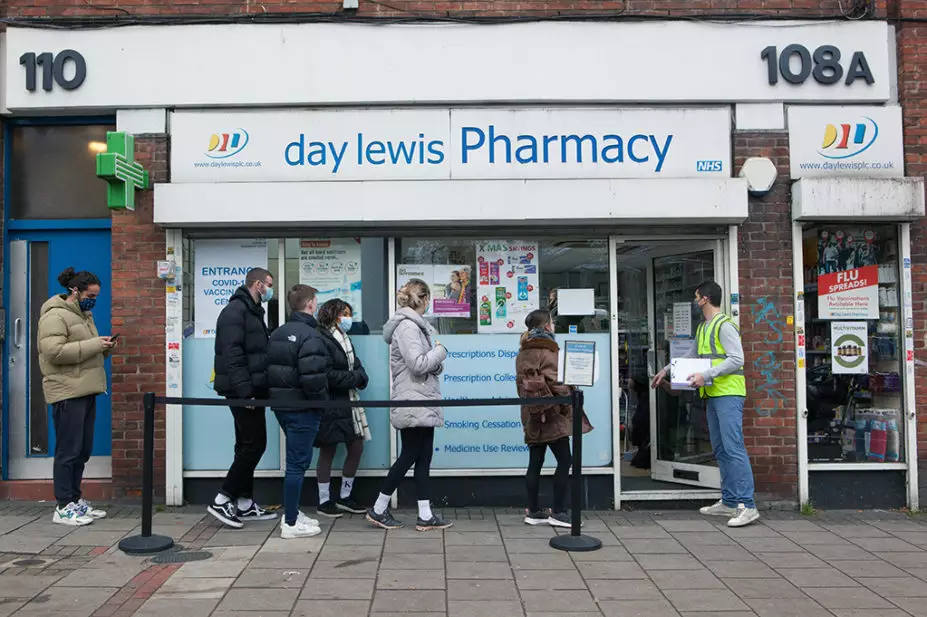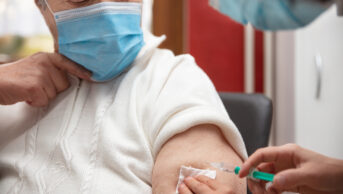
Anna Watson / Alamy Stock Photo
The Health and Safety Executive (HSE) decided not to investigate nearly 300 reports of occupational exposure to COVID-19 submitted by NHS organisations, including 83 deaths, according to information obtained by The Pharmaceutical Journal.
Responding to a Freedom of Information (FOI) request, HSE has revealed that 287 reports dated between January 2020 and May 2022 were labelled as “non-reportable” and not followed up because the body claimed there was “no clear evidence” occupational exposure was the likely cause of the COVID-19 infection.
In response, NHS staff trade unions have said it was a “shameful dereliction of duty” not to investigate, particularly as employers would only submit a report if they thought COVID-19 infection at work was highly probable.
The revelation comes as the UK’s ‘COVID-19 Inquiry‘, which began work in June 2022, begins to examine the UK government’s decision-making during and response to the COVID-19 pandemic.
In May 2022, The Pharmaceutical Journal revealed that 89 reports of occupational COVID-19 exposure from three NHS trusts under the ‘Reporting of Injuries, Diseases and Dangerous Occurrences Regulations (RIDDOR) 2013’ were not investigated by HSE, including ten deaths.
However, in its response to a FOI request sent by The Pharmaceutical Journal on 9 June 2022, HSE has revealed that the total number of RIDDOR reports from all NHS organisations is much higher.
All employers are legally required by RIDDOR to log incidents with HSE where an employee has been diagnosed as having COVID-19 or an employee has died as a result of occupational exposure to the virus.
HSE flagged 204 RIDDOR reports from NHS organisations relating to non-fatal cases of COVID-19 as “non-reportable” between 30 January 2020 and 19 May 2022. A further 83 RIDDOR reports from NHS organisations relating to fatal cases of COVID-19 were also flagged as “non-reportable” in the same period.
“Some employers took a precautionary approach and reported COVID-19 where there was no clear evidence to suggest that occupational exposure was the likely cause of an infection,” HSE’s response said. “Such reports were then flagged as ‘non-reportable’.”
Only cases deemed ‘reportable’ were then investigated in accordance with HSE’s investigation procedure.
According to advice from HSE (see Box), for an incident to be deemed reportable and investigated “there must be reasonable evidence suggesting that a work-related exposure was the likely cause of the worker contracting COVID-19” or that “a work-related exposure to coronavirus was the likely cause of death”.
Unions, including the British Medical Association (BMA), have warned that the numbers of people who died following exposure to COVID-19 at work have been “massively under-reported” by employers
Raymond Agius, occupational medicine committee co-chair at the BMA, said it was “particularly worrying” that hundreds of reports from employers were not investigated.
“These reports will have already reached a high threshold to be reported by NHS trusts in the first place; for HSE to fail to investigate them is a shameful dereliction of duty. After being exposed to increased risk working on the frontline during the COVID-19 pandemic, there are now doctors and healthcare workers across the country living with the long-term, debilitating impacts of having caught the virus. It is only right that when an employee has become infected with coronavirus at work that it should be reported and investigated.
“Without investigating these reports, the HSE will be unable to identify unsafe workplaces, running the risk that more people may become needlessly infected,” Agius added.
“As well as making it harder to monitor and stop the spread of the virus, the failure to investigate RIDDOR reports may deny staff and their families justice and jeopardise their ability to claim injury allowance.”
The latest data from the Office for National Statistics suggest that 5% of people working in the healthcare sector currently have long COVID.
An NHS Injury Allowance enables staff taking sick leave, or on a phased return to work, owing to a health condition attributable to their employment to top-up their salary to 85% of their pay.
Paul Day, director of the Pharmacists’ Defence Association, said the purpose of the RIDDOR reports was to not to allocate blame.
“Employers, governments and others need to collectively ensure the health system and wider country is better prepared for next time, and that isn’t going to happen if organisations refuse to examine cases,” he said.
“Somehow, we need to understand the likely routes the virus took, and how to better protect health workers and their patients on future occasions.”
A spokesperson for HSE said: “Throughout the pandemic we were committed to building an accurate picture of workplace exposure and risk. Where there was clear evidence of workplace risk we investigated fully.”
Box: How Health and Safety Executive COVID-19 reporting advice changed
The Health and Safety Executive (HSE) first published guidance for reporting incidents relating to COVID-19 under the ‘Reporting of Injuries, Diseases and Dangerous Occurrences Regulations (RIDDOR) 2013‘ in April 2020.
The guidance advised employers that they must report an incident “if there is reasonable evidence that someone diagnosed with COVID-19 was likely exposed because of their work”.
“An example of a work-related exposure to coronavirus would be a healthcare professional who is diagnosed with COVID-19 after treating patients with COVID-19,” it added.
However, this example was later removed from the HSE website and, in advice issued directly to many public bodies — including hospices, police forces and NHS trusts — HSE said: “It will be very difficult, if not impossible, for employers to establish whether or not any infection in an individual was contracted as a result of their work.
“Therefore, diagnosed cases of COVID-19 are not reportable under RIDDOR unless a very clear work-related link is established.
“HSE do not anticipate receiving many cases of RIDDOR reportable incidents, as such cases will not be easy to identify, and are anticipated to be rare, especially as prevalence of COVID-19 increases in the general population.”


